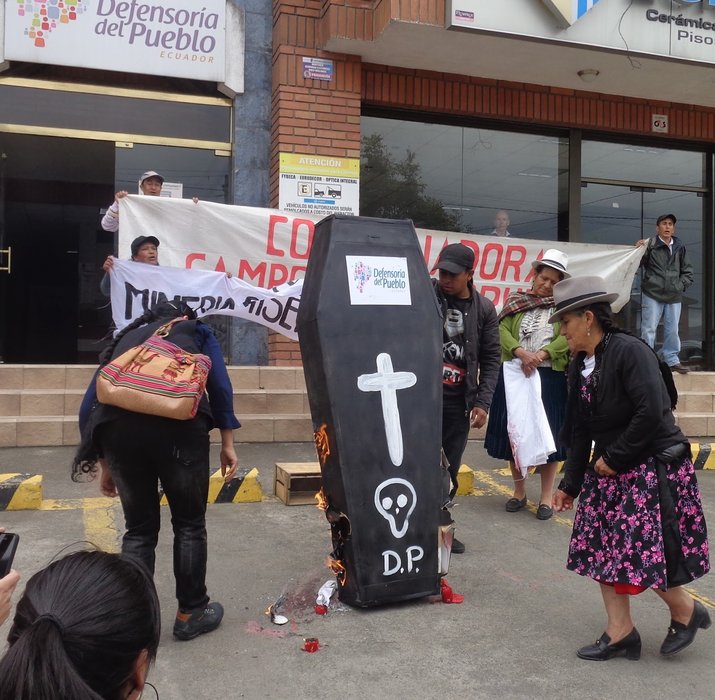
Peaceful Assembly
On 8th July, a court in Ecuador ruled against eight women human rights defenders from the organisation Frente de Mujeres Defensoras de la Pachamama (Women's Front for the Defence of Mother Earth). The General Coordination of the Defensoría del Pueblo in Azuay rejected the women's complaint, which alleged that police officers assaulted and arbitrarily detained them during a peaceful demonstration against a mining project in Río Blanco on 20th October 2015. Two weeks after the ruling, Defenders of the Pachamama, together with other civic organisations and members of the political organisation the Proletarian Block, protested in front of the City Hall and the Defensoría office, also releasing a statement rejecting the ruling. The director of Pachamama Lina Solano Ortiz said that although the office the Defensoría del Pueblo was mandated to protect and safeguard the rights of citizens, instead it was legitimising repression and police violence against women defenders of Mother Earth.
Expression
A journalist and television chain Teleamazonas were fined on 8th August for "media lynching", which is an offence under the Organic Communication Law. Days before, President Correa harshly criticised the journalist and television chain for having questioned the process for procuring medicines used by the National Public Contracting Service (SERCOP). On 11th August, the Inter-American Press Association (IAPA) condemned the administrative and legal actions taken by the Ecuadorian authorities.
Meanwhile, between 18th April and 21st July, local organisation Fundamedios documented no fewer than 806 complaints against 292 Twitter accounts. Many of these accounts were later blocked, suspended or had messages deleted for alleged violations of the social media site's rules. According to Fundamedios many of these accounts were critical of the Correa government.
On 15th July, the UN Human Rights Committee published its findings on the civil and political rights record of a number of countries including Ecuador. The concluding observations express concern about practical and legal measures that could affect freedom of expression in Ecuador. These measures include a prohibition on dissemination of information through the media for the purposes of discrediting a natural or legal person, or for purposes of reducing their public credibility. Noncompliance with this rule can lead to severe penalties.
Association
On 18th August, the Ministry of Education announced the dissolution of the teachers' union National Union of Educators (UNE), which has been in existence for more than 60 years. The decision is based on the union's alleged non-compliance with the law on social organisations. UNE has called for the annulment of the decision claiming the government used vague justification for the dissolution. UNE is one of the biggest unions in Ecuador and is adamantly opposed to some government policies. It has even filed complaints of workers' rights violations before the International Labour Organization (ILO) and the UN Human Rights Committee. Local civic group Fundamedios had earlier highlighted the danger of such kinds of arbitrary suspensions or closures based on vague, ambiguous or discretionary criteria at a regional hearing with the Inter-American Commission on Human Rights in April.